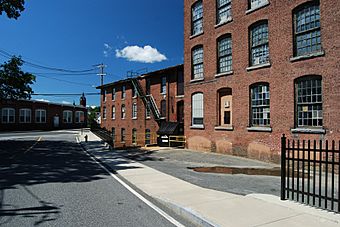Ware Millyard Historic District facts for kids
Quick facts for kids |
|
|
Ware Millyard Historic District
|
|
 |
|
| Location | Ware, Massachusetts |
|---|---|
| Area | 42 acres (17 ha) |
| Built | 1825 |
| Architect | Gardner, Eugene; Et al. |
| Architectural style | Late 19th And 20th Century Revivals, Greek Revival, Late Victorian |
| NRHP reference No. | 86003508 |
| Added to NRHP | November 21, 1986 |
The Ware Millyard Historic District is a special historical area in Ware, Massachusetts. It's like a time capsule from the 1800s. Here, you can see old factory buildings and homes where workers lived. These buildings show how people worked and lived long ago. The district was added to the National Register of Historic Places in 1986. This means it's an important place to protect.
Contents
Discovering the Ware Millyard
The Ware Millyard Historic District covers a large area. It includes buildings from the 19th century. These are old factories and a village built for the factory workers. The district is near South Street, the Ware River, and Park Street.
What You Can See
The area has many old mill buildings. Some of these date back to the 1840s. You can also see homes built for the millworkers. These homes, called tenement-style housing, were built between 1845 and the 1880s. They show how many families lived close to their work.
History of the Mills
The Ware Millyard area was first used for industry a long time ago. In the 1700s, a man named Jabez Olmsted built a sawmill here. He used the power of the Ware River's waterfalls.
How the Mills Started
In the early 1800s, new ways of making cloth became popular. Investors saw a chance to build textile factories here. In 1821, they bought the rights to use the river's power. Then, in 1823, they started the Ware Manufacturing Company.
Planning the Mill Town
The company carefully planned the whole area. They put the factories right next to the river. They also built a dam and a pond to control the water. Homes for the workers were planned on streets north of the factories. You can still see parts of this original plan today.
Old Buildings and New Growth
Some parts of the water system are very old. However, most of the main factory buildings were built later. Only one building, the company office, remains from the earliest days. For almost 100 years, this mill was the biggest employer in the area. Many people worked here.



